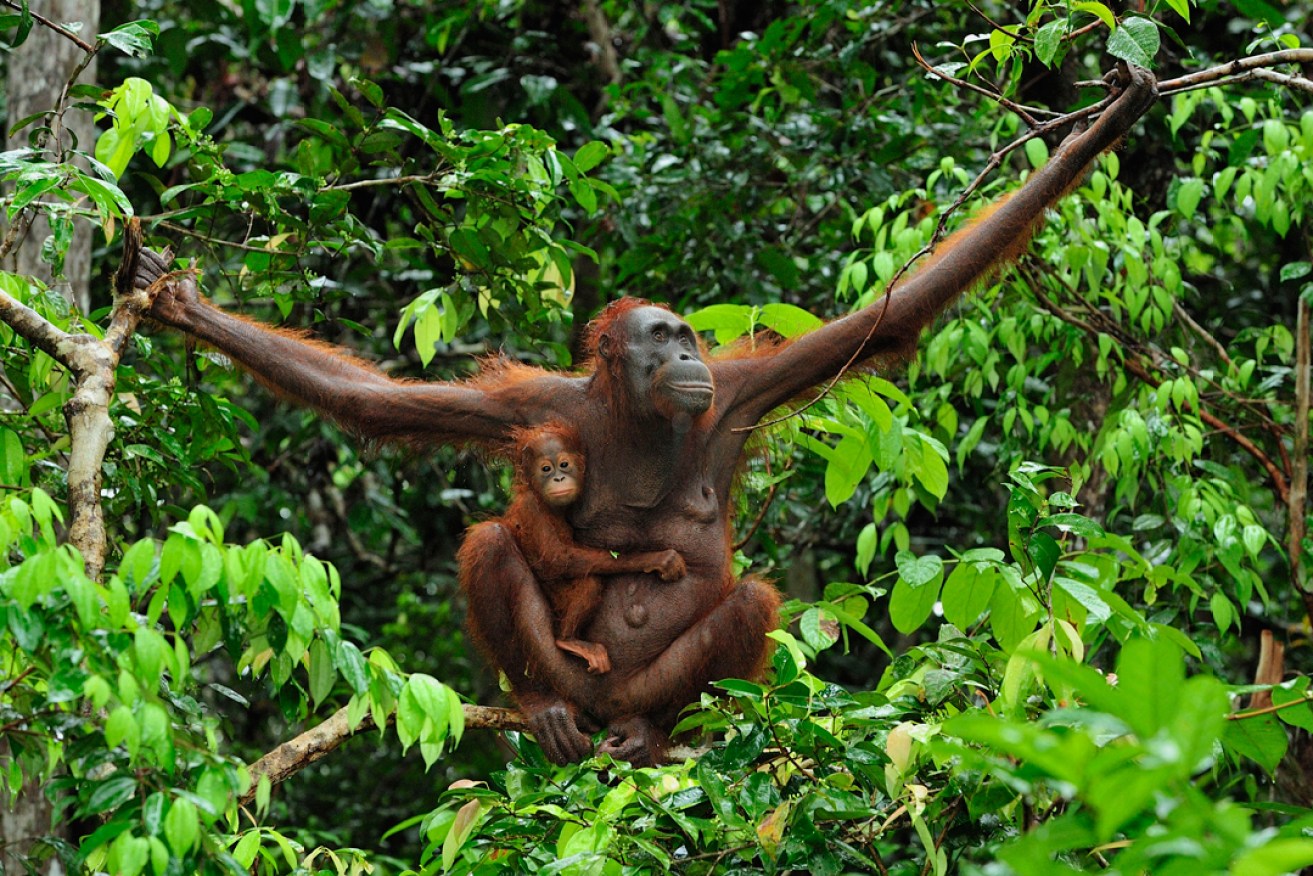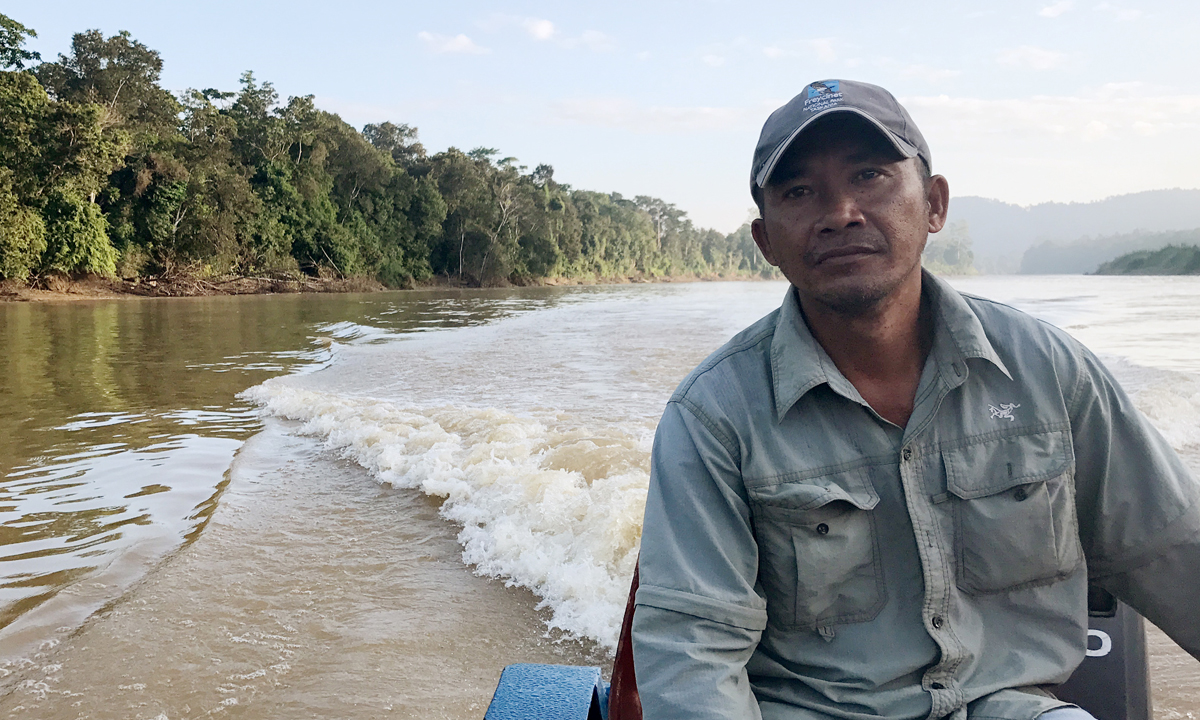Palm oil weighs heavily on Borneo’s mind
It’s a rare but unforgettable experience to spot a family of orangutans in the wilds of Borneo’s rapidly diminishing jungles.

In the past, tour guides could confidently promise an orangutan sighting. Photo: Mary Evans Picture Library
A ruffle in the trees stops our local guide Aloi in his tracks. He gasps and narrows his eyes, which flicker through the twisted branches soaring above the ground.
He has noticed something moving between the trees. He tip-toes forward a few steps before quickly raising his arm to stop the rest of us from following.
He smiles a wide grin and puts one hand to his lips to hush us. With the other he waves us in, one by one so as not to disturb the peace that radiates through Borneo’s jungle.
I advance gently. He softly places his hands on my shoulders and points straight ahead. Suddenly, I no longer feel suffocated by the heat and humidity. My skin is cool and a shiver of excitement runs down my spine, tingling at my toes.
I’ve never seen an orangutan before and at this exact moment a family of three are sitting directly above me. I stare at them in fascination as they go along with their mundane tasks. They are just like us, I whisper to myself.
A young, naughty orangutan teases its mother who is munching on a leaf, swinging from branch to branch, running laps around her. She grabs a limb and roughly pulls the small ape towards her bloated belly. That’ll teach him. A larger male orangutan scratches his bottom on the opposite tree.
Aloi giggles. Then – more ruffles.
He jumps to the other side and points, sporting that same cheerful grin. He, like the rest of us, is in disbelief as another orangutan crawls down a sturdy tree.
We weren’t expecting to see any in the wild, let alone four. Aloi kept saying “maybe” and “if we are lucky”. Thirty years ago, he could have confidently promised his tour group of orangutans in the jungle. Now, he’s careful what he promises.

Tour guide Aloi Sahrel on the Kinabatangan River, Sabah. Photo: Simone Ziaziaris / AAP
Aloi has lived in Sungai Kinabatangan in Sabah, Malaysian Borneo, his entire life. He weaves confidently through the jungle as though it were his backyard, and recalls the days when bumping into an orangutan was no surprise, nor was spotting sun bears climbing up and down trees.
Today, only 22,000 orangutans are left in Borneo, he says, and 11,000 in Sabah. He hasn’t seen a sun bear in almost a decade.
Borneo is the world’s third-largest island, made up of Brunei, the Indonesian provinces in Kalimantan, and Malaysian states, Sabah and Sarawak. The island represents only 1 per cent of the earth’s terrestrial surface but is home to roughly 6 per cent of the world’s flora and fauna, including the orangutan, elephants, the proboscis monkey and numerous birds and plants, according to the World Wildlife Fund (WWF).
But Borneo’s forests are quickly diminishing at the hands of social pressures. It’s an ecological disaster that leaves visitors like myself feeling overwhelmed and helpless.
Roxy, a former Miss Sabah 1997 turned wildlife guide and ranger, can’t contain her glee as we slowly and regretfully walk away from the family of orangutans. We won’t see them in the wild again during this trip.
As we head towards Gomantong Caves, known for being home to thousands of bats and cockroaches, she explains that more than half of Borneo’s rainforests are now gone as a result of heavy deforestation, which started in the 1980s, mainly to source timber and other minerals. As she talks her usual high and chirpy pitch becomes deep and serious. It saddens her to talk about the reality of her country’s jungle canopies.
One of the major drivers has been to grow palm oil plantations, which now cover thousands of acres and produce the world’s most consumed vegetable oil. The plantations adapt well to the local soil and last about 25 years before they need to be replanted.
We have been introduced to these activities [deforestation] by outsiders
Palm oil brings in a magnitude of wealth for Borneo. It’s used in about half of all packaged products at the supermarket – from noodles to shampoo and lipstick. As a result, many of Borneo’s wildlife, whose homes lie within the rainforest, have become extinct or are endangered.
Last year, the International Union for Conservation of Nature (IUCN) reclassified the threat status for the Bornean orangutan from “endangered” to “critically endangered”.
“Our orangutans at this moment, there are not many – but it is breeding good,” Roxy says, adding non-government organisations are helping to fund local rehabilitation centres in a bid to save the species.
She says Sabah’s government is also working to educate locals to see the wildlife as a source of income through tourism, as opposed to relying on palm oil for money. “We have been introduced to these activities [deforestation] by outsiders,” Roxy says. “Our locals don’t understand this. All they want is money and you get paid a lot of money so they are willing to do this.
“When they do that, we lose another source of income, our tourism, because we don’t have the animals anymore.”
WWF’s latest environmental status report confirmed a continuing trend of decline in Borneo.
“Ease of access for logging and its suitability for palm oil production and agriculture have made it one of the most endangered habitats on earth,” the 2016 report found.
Roxy says the Sabah government has responded to the concern by preventing foreigners and locals from buying or using any more land to plant palm oil trees.
“What you see is what you get,” she says, adding initiatives into replanting native fauna are being put in place to regain forest land.
“Now there is no more cutting the forest for palm oil. The government has regulated this to save the animals and also as a move against global warming. Now we are trying to claim back whatever is left.”
Getting there: Singapore Airlines and AirAsia both fly to Kota Kinabalu in Sabah, Borneo. AirAsia flies with one stopover at Kuala Lumpur. G Adventures will organise an eight-day adventure for you starting from $1499. The trip includes time spent in Turtle Island National Park, Sepilok’s orangutan rehabilitation centre, Kota Belud, morning and evening river safaris in Kinabatangan and much more. Visit: www.gadventures.com.au
Staying there: Borneo Natural Sukau Bilit Resort sits right on the edge of Sabah’s longest river, the Kinabatangan. It is around two-and-a-half hours’ drive from Sandakan and is made up of 15 tavern-like rooms, hand crafted by local tradesman using the Borneo iron wood.
Playing there: The resort runs night-time walks through the jungle and daytime river boat cruises where you can spot hornbill birds, monkeys, crocodiles and, if you’re lucky, an orangutan. It also offers guests the experience of planting a local tree in a bid to rebuild Sabah’s rainforest.
* The writer travelled as a guest of G Adventures and Sabah Tourism.
-AAP




